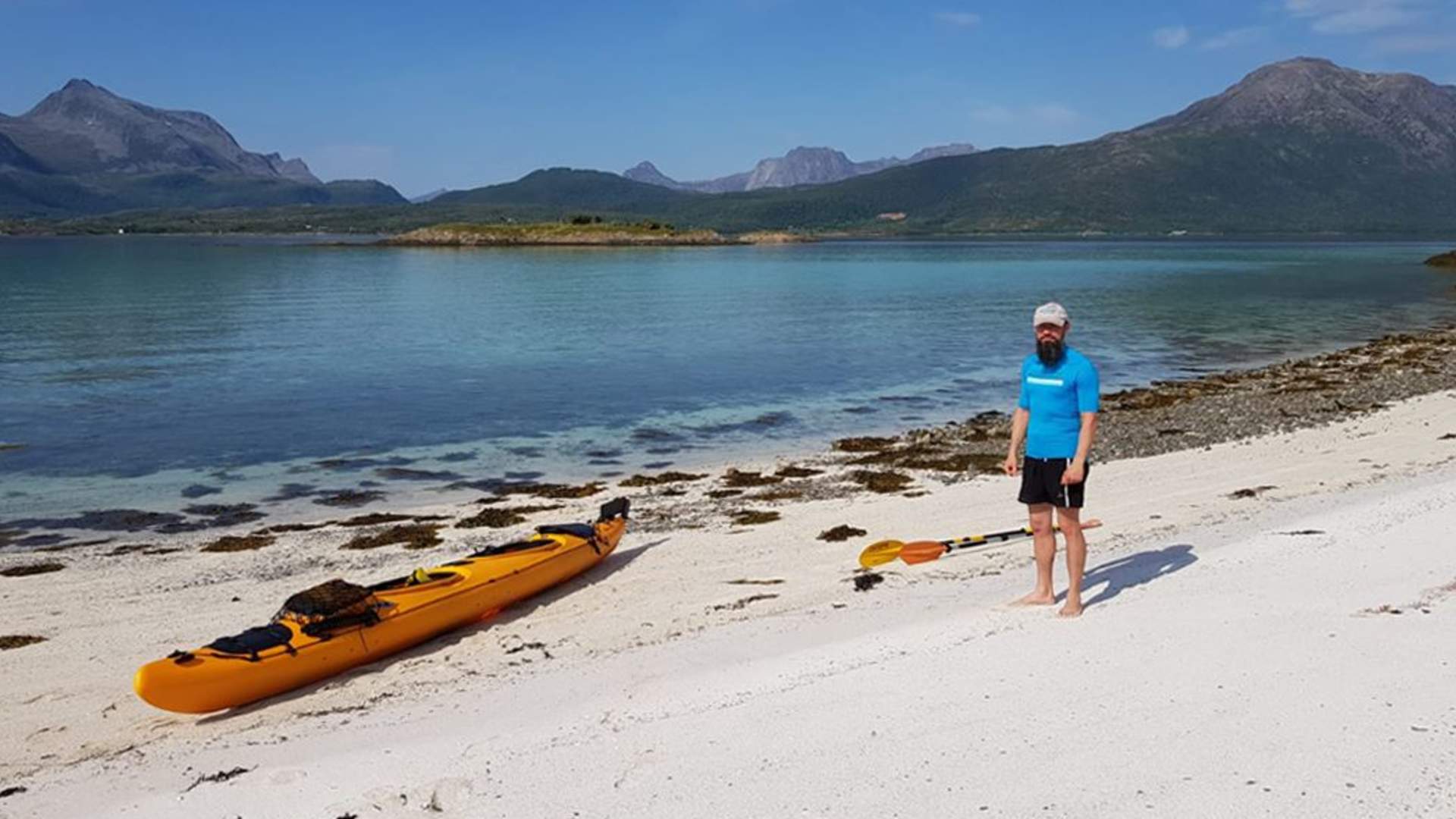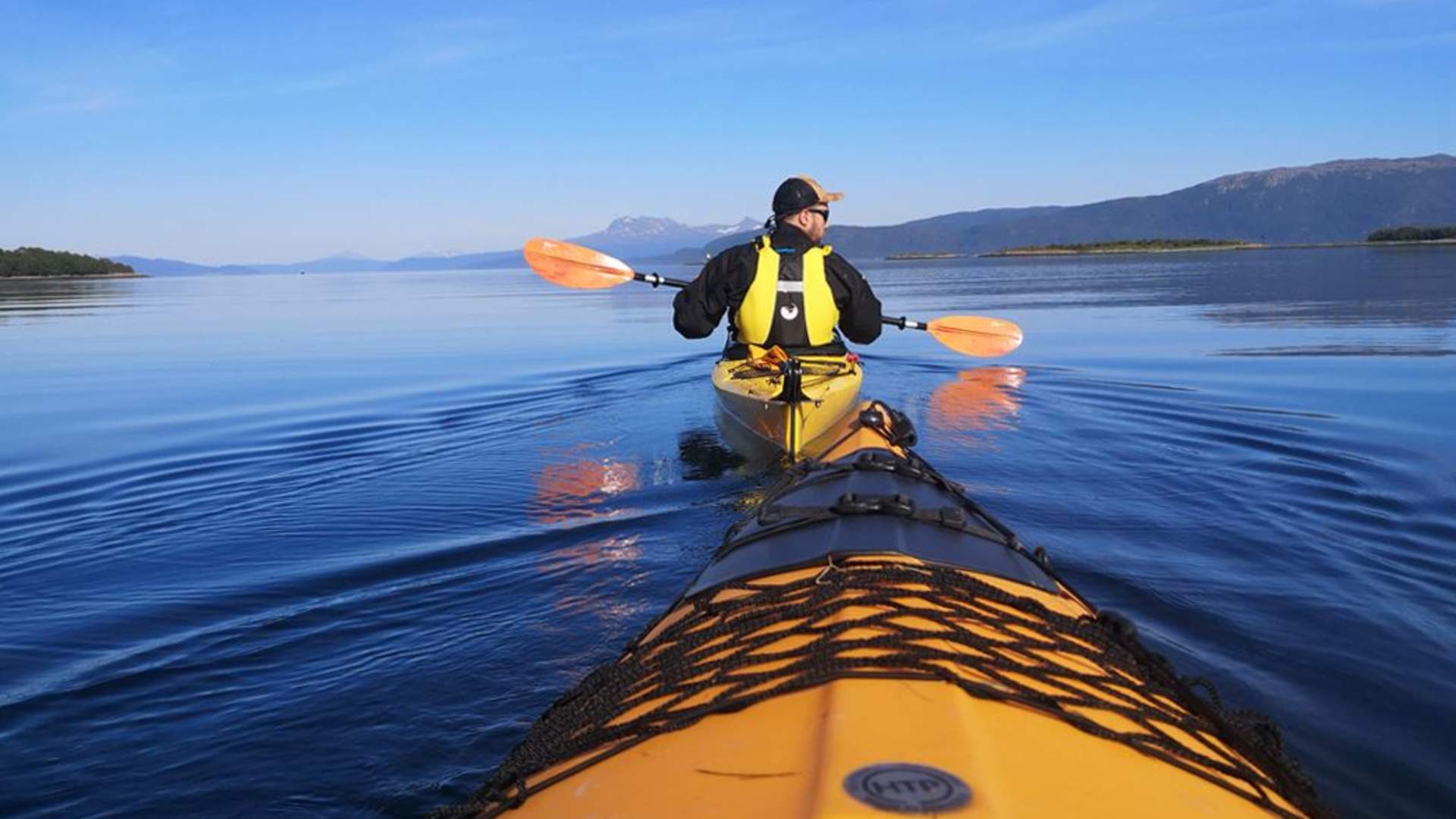Stonglandseidet
Monitoring Phytoplankton by Kayak







Kayak with us & collect data on phytoplankton.
Phytoplankton underpins the marine food chain & plays a central role in the Earth’s biogeochemical cycles & climate. Kayaking with us is the perfect way to collect this data. Take a closer look at Norwegian summer islands & coastline as you kayak through arctic waters. This ethical kayaking activity brings travellers into the summer sea-scape. Explore the famous south Senja Bay of Islands. Experience the best heart-stopping views of Norwegian fjords, islands and mountains. During your adventure activity along the northern Norwegian coastline we'll find the best place to enjoy your home-made meal. Relax and keep a look out for reindeer on the white sand beaches, eagles circling above, ptarmigans, and other wildlife. Don't forget to look down into the water where you'll be able to see down to the sea floor. The water is crystal clear, offering an unforgettable kayaking experience. This summer kayaking tour activity is the best way to explore the coast of northern Norway. After enjoying a light home-made lunch and our famous hot chocolate on a secluded beach, we'll paddle back to Senja.
By participating in our project, your holiday in Northern Norway will contribute to important science on many different fronts & you will be leaving a positive impact behind on local ecosystems & the local community.
Why is this project so important?
Marine phytoplankton accounts for approximately 50% of all photosynthesis on Earth, underpins the marine food chain and plays a central role in the Earth’s biogeochemical cycles and climate. In situ measurements of ocean transparency can be used to estimate phytoplankton biomass. The scale and challenging conditions of the ocean make it a difficult environment for in situ studies, however. Citizen scientists using a simple white Secchi Disk can collect ocean transparency data to complement formal scientific efforts using similar equipment. Citizen scientist data can therefore help understand current climate-driven changes in phytoplankton biomass at a global scale. Wandering Owl & Wild Lab Projects support the Secchi Disk project, a global citizen science initiative and maintains contact with Dr. Richard Kirby, the scientist who started and leads the Secchi disk project. Wandering Owl provides the logistics by organizing and leading the trips to the sampling sites at sea, assists the participants to maximize quality data, and keep the participants updated about the outcome of the Secchi disk project.
The data collected throughout the project will be used by our research partners in their ongoing study of phytoplankton.
What will you experience?
- Contribute to solving the data collection problem - that the ocean is immense & there are not enough helpers!
- Have fun in a small group of like minded people, meet & spend time with people who have similar interests
- Spend time in & experience nature & explore Norwegian wilderness
- Learn new things & skills
- Participate in a meaningful action, get a sense of purpose and achievement
- Take part in a research project & become a citizen scientist
- Learn about the Secchi Disk method
What are the goals of the project?
- Increase awareness among the participants & generate interest in marine litter as an environmental problem
- Offer travellers alternatives that benefit science & nature conservation
- Generate more data & knowledge to help solve the problem of beach litter
- Encourage the participants to start similar cleanup missions elsewhere
- Promote networking & join existing forces
- Cooperate with local municipalities, involve locals
- Partner with local teachers & schools
- Collaborate with researchers & developers to help fine-tune the Deep Dive method
- Clean up the shoreline & reduce the risks that poses litter to local wildlife
What's the project plan?
This project takes place on a kayaking activity and goes for four hours. During your citizen science activity we'll kayak together along the northern Norwegian coastline to find the best place to take phytoplankton samples. After we have collected the samples, we'll paddle onto a small island to enjoy your home-made meal & to give you a small talk on phytoplankton & the role is plays in our local ecosystems & why the data you have collected is so important. Relax and keep a look out for reindeer on the white sand beaches, eagles circling above, ptarmigans, otters and other wildlife. Don't forget to look down into the water where you'll be able to see down to the sea floor. The water is crystal clear, offering an unforgettable kayaking experience. This citizen science kayaking activity is the best way to explore the coast of northern Norway & to contribute to the global monitoring of phytoplankton. After enjoying our famous home-made vegan & gluten free hot chocolate, we'll paddle back to Stonglandseidet, Senja.
Practical information:
Included: All equipment needed, a light lunch, hot chocolate, tripods, & photos of the project in web-sized resolution.
Please bring: Appropriate clothing
Number of participants: 2 - 5 adults (one of the kayaks is a double kayak)
Level of difficulty: medium
Departure time and place: 10:45 in front of Senja Roasters, Stonglandseidet
Duration: 4 hours
By participating in our project, your holiday in Northern Norway will contribute to important science on many different fronts & you will be leaving a positive impact behind on local ecosystems & the local community.
Why is this project so important?
Marine phytoplankton accounts for approximately 50% of all photosynthesis on Earth, underpins the marine food chain and plays a central role in the Earth’s biogeochemical cycles and climate. In situ measurements of ocean transparency can be used to estimate phytoplankton biomass. The scale and challenging conditions of the ocean make it a difficult environment for in situ studies, however. Citizen scientists using a simple white Secchi Disk can collect ocean transparency data to complement formal scientific efforts using similar equipment. Citizen scientist data can therefore help understand current climate-driven changes in phytoplankton biomass at a global scale. Wandering Owl & Wild Lab Projects support the Secchi Disk project, a global citizen science initiative and maintains contact with Dr. Richard Kirby, the scientist who started and leads the Secchi disk project. Wandering Owl provides the logistics by organizing and leading the trips to the sampling sites at sea, assists the participants to maximize quality data, and keep the participants updated about the outcome of the Secchi disk project.
The data collected throughout the project will be used by our research partners in their ongoing study of phytoplankton.
What will you experience?
- Contribute to solving the data collection problem - that the ocean is immense & there are not enough helpers!
- Have fun in a small group of like minded people, meet & spend time with people who have similar interests
- Spend time in & experience nature & explore Norwegian wilderness
- Learn new things & skills
- Participate in a meaningful action, get a sense of purpose and achievement
- Take part in a research project & become a citizen scientist
- Learn about the Secchi Disk method
What are the goals of the project?
- Increase awareness among the participants & generate interest in marine litter as an environmental problem
- Offer travellers alternatives that benefit science & nature conservation
- Generate more data & knowledge to help solve the problem of beach litter
- Encourage the participants to start similar cleanup missions elsewhere
- Promote networking & join existing forces
- Cooperate with local municipalities, involve locals
- Partner with local teachers & schools
- Collaborate with researchers & developers to help fine-tune the Deep Dive method
- Clean up the shoreline & reduce the risks that poses litter to local wildlife
What's the project plan?
This project takes place on a kayaking activity and goes for four hours. During your citizen science activity we'll kayak together along the northern Norwegian coastline to find the best place to take phytoplankton samples. After we have collected the samples, we'll paddle onto a small island to enjoy your home-made meal & to give you a small talk on phytoplankton & the role is plays in our local ecosystems & why the data you have collected is so important. Relax and keep a look out for reindeer on the white sand beaches, eagles circling above, ptarmigans, otters and other wildlife. Don't forget to look down into the water where you'll be able to see down to the sea floor. The water is crystal clear, offering an unforgettable kayaking experience. This citizen science kayaking activity is the best way to explore the coast of northern Norway & to contribute to the global monitoring of phytoplankton. After enjoying our famous home-made vegan & gluten free hot chocolate, we'll paddle back to Stonglandseidet, Senja.
Practical information:
Included: All equipment needed, a light lunch, hot chocolate, tripods, & photos of the project in web-sized resolution.
Please bring: Appropriate clothing
Number of participants: 2 - 5 adults (one of the kayaks is a double kayak)
Level of difficulty: medium
Departure time and place: 10:45 in front of Senja Roasters, Stonglandseidet
Duration: 4 hours
Source: Visit Senja Region
Monitoring Phytoplankton by Kayak